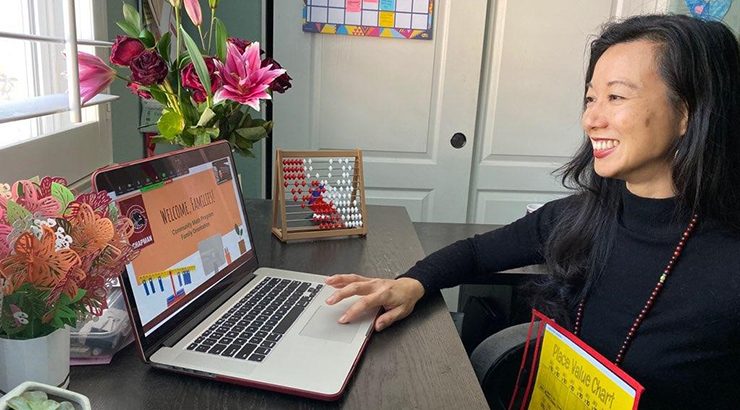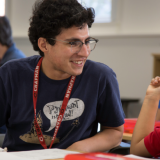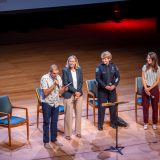
Chapman Launches Community Math Learning Program Virtual community math tutoring program grounded in social justice standards
March 23, 2021
Faculty and students in Chapman University’s Teacher Education program have launched a new Community Math Learning Program that integrates teacher education training and community math enrichment. Embedded within the Attallah College of Educational Studies’ accelerated MA in Curriculum and Instruction teacher education program, the math center uses a virtual learning environment to serve local families and youth while giving Chapman graduates hands-on practice.
Cathery Yeh, Ph.D., the faculty director of the new Community Math Learning Program, modeled the tutoring program after Attallah College’s Kathleen Muth Literacy Center, which has served Orange County youth for more than 40 years. The Community Math Learning Program gives Chapman students opportunities to practice research-based math instructional routines while providing free mathematics support and enrichment for students in the community.
The primary goal of the program is for the Chapman students and the K-12 children to learn by doing. As part of Attallah College’s commitment to innovation and to positively impacting Orange County schools, graduate students in the Teacher Education program leverage virtual tools and online spaces to create rich mathematical experiences.
Virtual Learning Environment
Dr. Yeh explains the abrupt shift to remote learning last spring presented both a massive challenge and an opportunity. At the beginning of the pandemic, she started creating virtual learning tools and sharing them with communities and families because there was a need.
Like so many educators forced to transition to remote instruction this year, the Chapman faculty and students had to enhance their knowledge of educational tools to teach mathematics.
“We had to shift to online thinking and brainstorm what a rich online learning environment should be,” said Dr. Yeh. “What does it mean to do community math online? And how do you do this work given our commitment to working with children who are in urban settings and some of these online resources may be new for them?”
At the core of the program is a suite of technology not available just few years ago, including Zoom, Google Classroom, and Nearpod. Every activity Yeh and her team developed is problem-based and focused on students’ reasoning and sense-making, with no need to buy a separate textbook or resource.
To integrate these tools and help families and students access resources, Yeh and her team created a Virtual Math Classroom as a one-stop shop virtual learning environment. Dr. Yeh said the virtual learning tools have offered Chapman students a wonderful opportunity to prepare for their future classrooms.
“We’re preparing our Chapman students to become adept with digital education tools for in-person or online instruction. In an online setting with children of different ages — where you can’t hear them all at once, and you have to mute and unmute — they are learning to use technology such as Nearpod to see student thinking, beyond just verbal input,” said Dr. Yeh. “The students we are tutoring are bilingual, across ability status so really thinking about using these tools in intentional ways to attend to and leverage student differences and strengths.”
Anti-bias Teaching and Learning
Dr. Yeh’s approach to mathematics education is grounded in her academic research on anti-bias teaching and learning. Her work seeks to build on the knowledge base of all students, regardless of background, English language proficiency or ability, and explores ways to teach math in ethical ways.
Learning for Justice, an online magazine and resource site founded by the Southern Poverty Law Center, used Dr. Yeh’s scholarly work in schools to create a Mathematics in Context Toolkit and made it available online to K-12 educators and families. The toolkit helps educators consider how to “humanize math” using Learning for Justice’s Social Justice Standards. It provides opportunities for reflection and real-world examples of how to apply the social justice standards in the context of mathematics.
“We can help children experience mathematics through problem solving, reasoning, play, and real-world application,” said Dr. Yeh. “We can do so in a way that honors their identities and celebrates diversity.”
Katie Tucker, a senior IES major who is entering her graduate studies in Chapman’s accelerated MACI teacher education program this summer, explained that her experiences in the Community Math Program have shown how important it is for teachers to build connections between math and their students’ background knowledge, even in virtual environments: “Math is all around us. I’ve really enjoyed learning tools and techniques to ensure that all my students develop a love for math.”
Free, Online Resources
Families and educators are encouraged to make of a copy of the Virtual Math Classroom, which includes math resources and a Math Task Bank with 30 different types of math tests and tasks, from pre-K through 12th grade.
Chapman’s Teacher Education program students and faculty also created a free, online Chapman U Math at Play Video Series. Posted to an open YouTube channel, the series addresses pre-K through 8th grade mathematics standards and is accessible to educators and families alike. Video lessons are available in English and Spanish. Activity handouts are also available for download in English and Spanish.
For Sophie Bauer, another MACI student who is studying to becoming an elementary teacher, the Community Math Learning Program has shaped how she’ll approach mathematics instruction in her future classrooms.
“My vision for math in the future is to teach in a way where kids feel connected to the material. My hope is that students look forward to math, feel confident in doing math, and see the importance of it. Dr. Yeh has opened my eyes to many new ways to teach math that make it relevant and fun for students,” said Bauer. “I’m excited to implement these new ideas, techniques, and tools to cultivate a love of math in my students.”
Moving forward, Dr. Yeh and her colleagues and students will continually add to these resource pages and virtual environments. Visit the Community Math Learning Program website for updates and additional resources.
The Community Math Learning Program is made possible in Spring 2021 by the generous support of the Klein Family Foundation.

